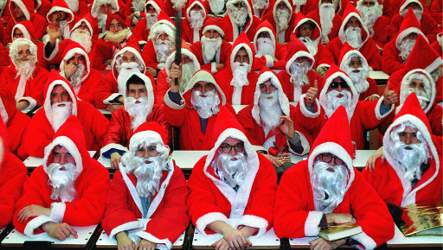Leave it to Germans to impose a stringent code of conduct on even jolly old St. Nick impersonators.
On a drizzly December evening, the cold and naked hallways of Berlin’s Technical University are brightened by a troop of men dressed in long red coats, heavy black boots, and fluffy white beards as they march into the cafeteria. A hearty, synchronized “ho, ho, ho,” booms through the halls repeatedly, erasing all doubts that there is serious Christmas business afoot. With proper Teutonic thoroughness, tonight hundreds of Santa wannabes will have to pass muster in costume control, Christmas carols and customer service skills before they’ll be allowed to decide for themselves who’s been naughty or nice.
Click here for a photo gallery of Berlin’s Santa boot camp.
“The kids are our clients and it’s all about them,” rosy-cheeked veteran Weihnachtsmann Frank Wiebe tells The Local. “We have to give them a memorable experience, it’s not just presents,” he says, slapping his thigh and offering his knee with a wink.
Wiebe has served with the student job agency Heinzelmännchen or “elves,” for 31 years. It has long been an established part of Berlin Christmas tradition, providing St. Nicks for hire at private parties, schools and office events since 1949. Each year the agency hires some 500 Santa impersonators of all ages and nationalities to fill up to 5,000 local orders. But these aren’t just old men with boozy breath and an unhealthy interest in children – the Kris Kringle imitators take their code of honour seriously and are not allowed to don their robes without training in the subtle arts of carol singing and knee bouncing.
Wiebe conducts costume control, and says that it takes much more than an authentic beard and a belly like his to be a good Santa.
“It’s not just a red coat and black boots,” the 73-year-old says. “We demand white gloves because young, wrinkle-free hands would give everything away, because Santa is supposed to be an old man.” In addition to the required jute bag and shiny bell, professional Santas are required to carry a traditional golden book full of carols and key information on the naughty and nice, which parents provide when they order a Heinzelmännchen impersonator.
To make sure that children have good memories of their holiday experience, the organisation banned St. Nick’s traditional rod from the costume. “There are only good children,” Wiebe says as he signs and stamps the cards of appropriately dressed students.
“Everyone who doesn’t come in full costume tonight doesn’t get the seal of approval and therefore no job until they show up in the full garment,” Wiebe chants ceremonially as he sends an unsatisfactory “youngster” away.
Once Santa applicants have their uniforms approved with an official stamp, they are indoctrinated with the do’s and don’ts of holiday behaviour.
“Santa can’t use the toilet when visiting a family. That ruins the image,” Tarik Kilinc, the programme’s project manager tells The Local, adding that Santa also does not drink, eat or smoke when he’s on the job.
“And Santa doesn’t swear, of course,” adds Stefan Zwingel, this year’s Oberweihnachtsmann, or “Superior-Santa.” The 44-year-old is in charge of separating the wheat from the chaff. “Last year we had to kick 20 people out, and being drunk isn’t even the biggest problem. One guy abandoned nine families on Christmas Eve and claimed he had a flat tire on his bike,” he says.
Click here for The Local’s visual guide Christmas markets.
Being a Heinzelmännchen Santa Claus is a big responsibility, especially because the fragile emotions of children are at stake. “The kids probably thought it was their fault that Santa didn’t show up that night and that will stick,” Zwingel says.
Many applicants for the temporary holiday job are only in it for the money, veteran Wiebe says. At €28 per job, old St. Nick can earn up to €300 on a busy night. But the yearly vetting process does a good job of weeding out subpar Santas.
The money isn’t bad, Wiebe says. “But I am mainly in it for the fun,” he adds, bellowing a deep “ho, ho, ho,” before joining in group Christmas carol practice.
Click here for The Local’s guide to Germany’s best Christmas markets.



 Please whitelist us to continue reading.
Please whitelist us to continue reading.